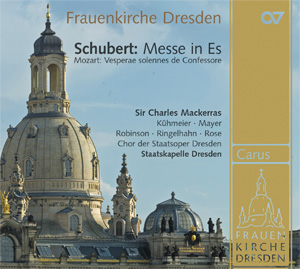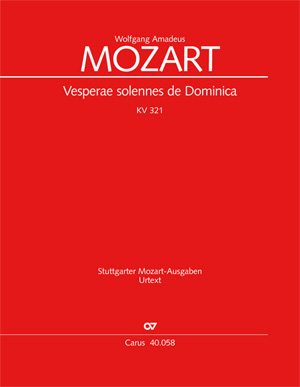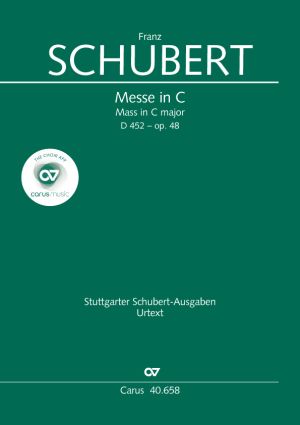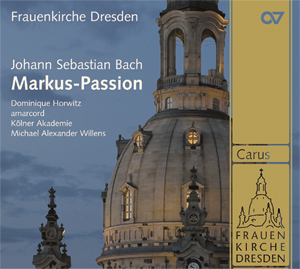
Schubert: Messe in Es und Mozart: Vesperae solennes de Confessore
Schubert’s connection to sacred music originated during his youth, when he sang as an eleven-year-old soprano soloist in the Lichtenthal Church in Vienna and later also contributed compositions for mass, as well as other sacred works for worship services. On the other hand the Mass in E flat major D 950 is among Schubert’s last completed works. It was composed in 1828, probably for the Trinity Church in Vienna, Alsergrund. Like many of Schuberts works on a large scale, it was largely forgotten after his death and was only rediscovered on the initiative of Johannes Brahms in 1865. Sir Charles Mackerras conducted the Mass with the Staatskapelle Dresden in this recording for his belated debut at the Dresdner Faruenkriche with renowned soloists, including Genia Kühmeier und Matthew Rose. Mozart’s equally-beloved Vesperae solennes de confessore KV 339, with the famous „Laudate Dominum“ completes this recording and it is much more than just a supplement to Schubert’s Masse – it points towards the roots of Schubert’s sacred music. The booklet contains an in-depth interview with Sir Charles Macherras.
Purchase
Additional product information
Contents
-
Preface writer
Tobias Niederschlag
-
Ensemble
Chor der Sächsischen Staatsope
-
Ensemble
Staatskapelle Dresden
Founded in 1548 by the Elector Moritz von Sachsen, the Staatskapelle Dresden is among the world’s oldest orchestras and it is rich in tradition; it is probably the only one which has existed continuously for more than four and a half centuries, and has always been among the leading orchestras during every epoch. Along with its unique musicianship, founded on its quite specific ensemble spirit, the unmistakable sound of the Staatskapelle has evolved through its long tradition in matters of timbre, transparency and homogeneity, which has lead audiences and critics everywhere to refer to it as one of the great orchestras of our time. Important conductors and internationally celebrated instrumentalists have left their mark on the former Hofkapelle, now Staatskapelle. Its musical directors have included Heinrich Schütz, Johann Adolf Hasse, Carl Maria von Weber and Richard Wagner, who called the orchestra his “miraculous harp.” Important principal conductors of the 20th century were Ernst von Schuch, Fritz Reiner, Fritz Busch, Karl Böhm, Joseph Keilberth, Rudolf Kempe, Otmar Suitner, Kurt Sanderling and Herbert Blomstedt. From 1992 until his death in 2001 Giuseppe Sinopoli was the principal conductor, then from 2002 until 2004 Bernard Haitink. At the beginning of the 2007/2008 season Fabio Luisi became General Musical Director of the Staatsoper Dresden and therefore also the principal conductor of the Staatskapelle Dresden. The honorary conductor of the orchestra since 1990 is Sir Colin Davis. In April 2007 the Sächsische Staatskapelle Dresden was the only orchestra so far to be awarded, in Brussels, the “Prize of the European Cultural Foundation for the preservation of the musical world cultural heritage”. Personal details
-
Conductor
Sir Charles Mackerras
| 1925-2010
-
Soloist - soprano
Christa Mayer
-
Soloist - soprano
Genia Kühmeier
-
Soloist - tenor
Oliver Ringelhahn
-
Soloist - tenor
Timothy Robinson
-
Soloist - bass
Matthew Rose
Reviews
[...] Der sehr gut disponierte Chor meistert nicht nur die hohen Anforderungen der Partitur scheinbar mühelos, sondern wird auch durch eng mensurierte Posaunen colla parte begleitet, was zu einem speziell hellen und schlanken Klangbild führt. [...]
Musik & Liturgie, 5/09
Frequent questions about this work
 There are no questions and answers available so far or you were unable to find an answer to your specific question about this work? Then click here and send your specific questions to our Customer Services!
There are no questions and answers available so far or you were unable to find an answer to your specific question about this work? Then click here and send your specific questions to our Customer Services!








